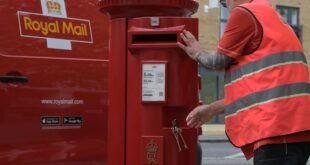Two teenagers have been charged with theft after allegedly intercepting a Royal Mail train in the middle of the night by tampering with signals.
Police were called to the West Coast main line at Kirtlebridge, south of Lockerbie, Scotland, at 1.42am on Tuesday after reports two young men had gained access to the train from the trackside.
The driver had brought the train to a stop after noticing a signal was not displaying any coloured light as expected.
Officers arrested two teenagers – aged 17 and 18 – who they found on board the train, which was carrying letters and parcels from Warrington, Cheshire, to the northern mail terminus at Shieldmuir, near Motherwell.
The incident caused delays to other services, including the Caledonian Sleeper from Inverness to Euston, while damage to the signal caused further disruption.
Nothing was stolen from inside the train, though both men have been charged with malicious mischief, theft and threatening and abusive behaviour, British Transport Police said.
In 1963, £2.61m (about £61m today) was stolen from an overnight Royal Mail train heading from Glasgow to London by a gang who changed signals from green to red, forcing the driver to stop. It later became known as the Great Train Robbery.
Commenting on Tuesday’s events, a Royal Mail spokesperson said: “We are aware of this incident and are supporting the British Transport Police in their investigation.”
British Transport Police said: “Officers were called to the line in Lockerbie at 1.42am this morning (1 August) following reports that two young men had gained access to a Royal Mail train, damaging signalling equipment in the process.
Police were called to reports that two men had gained access to a Royal Mail train at Lockerbie
(Alamy/PA)
“Officers attended and a 17-year-old and an 18-year-old were located in a carriage and arrested. At this stage, it’s not believed anything was stolen but a number of parcels in the carriage had been interfered with.
“Both young men have been charged with malicious mischief, theft and threatening and abusive behaviour.
“Enquiries are ongoing and anyone with information can contact BTP by texting 61016 or calling 0800 40 50 40 quoting reference 38 of 01/08/23.”
Source link



